Debunking Anti-EPA Talking Points
President Donald Trump’s Administration proposed to cripple the U.S. Environmental Protection Agency and roll back environmental regulations based on falsehoods that are often repeated by Republican members of Congress.
These anti-environmental talking points – that EPA has been growing and “killing” private sector jobs, and that regulations stifle economic growth – are useful, politically, because they provide excuses to loosen up rules for polluting industries that donate disproportionately to Republican Congressional political campaigns. But the rhetoric is demonstrably untrue, as documented by the links provided with this fact sheet.
Below are some fictions about EPA that you may hear, followed by the facts.
Jobs:
FICTION: Environmental regulations “kill jobs.” “We have begun a historic program to reduce the regulations that are crushing our economy — crushing,” Trump told the Conservative Political Action Conference in National Harbor, Md., on February 24, 2017.
FACT: Decades of economic research have documented that there is no evidence that environmental regulations “kill jobs.” Only two tenths of one percent of layoffs in the U.S. are caused by regulations of all kinds, including environmental regulations, according to the U.S. Department of Labor Statistics. Job losses are caused much more often by declines in business demand, corporate buy-outs, lower overseas labor costs and mechanization.
FICTION: The petroleum and coal industries are “job creators” that will hire more people if they are allowed to produce more fuel.
 FACT: Both the oil & gas and coal mining industries are increasingly mechanizing their operations to eliminate jobs, so they can increase profit for shareholders without hiring workers. According to the U.S. Bureau of Labor Statistics, the petroleum and coal products manufacturing industry cut their workforce by 27 percent between 1990 and 2015 while boosting their annual output more than four fold, from $171 billion to $818 billion. So expansion of the industry doesn’t necessarily mean an expansion of jobs.
FACT: Both the oil & gas and coal mining industries are increasingly mechanizing their operations to eliminate jobs, so they can increase profit for shareholders without hiring workers. According to the U.S. Bureau of Labor Statistics, the petroleum and coal products manufacturing industry cut their workforce by 27 percent between 1990 and 2015 while boosting their annual output more than four fold, from $171 billion to $818 billion. So expansion of the industry doesn’t necessarily mean an expansion of jobs.
State vs. Federal Responsibilities:
FICTION: We don’t need EPA, because the states can enforce environmental laws. U.S. Senator Dan Sullivan, a Republican from Alaska, said during the senate confirmation debate on Scott Pruitt on February 14, 2017: “The states are the primary protectors and implementers of our environmental protections laws. That’s in the law – that’s in the federal law.”
FACT: Pollution flows across state lines, and the federal Clean Air Act clearly states that EPA has a leadership role in establishing standards that the states must follow. “Federal financial assistance and leadership is essential for the development of cooperative Federal, State, regional, and local programs to prevent and control air pollution,” the law states. The federal Clean Air Act also specifies that EPA is in charge of enforcing the law and making sure the states follow it: “Except as otherwise expressly provided in this Act, the Administrator of the Environmental Protection Agency shall administer this Act,” the law states.
Fossil Fuels:
FICTION: President Obama’s EPA bankrupted the coal industry.
FACT: Over the last decade, technological innovations in the drilling industry — hydraulic fracturing and horizontal drilling – produced such a glut of natural gas that gas became cheaper than coal as a fuel for coal-fired power plants, making coal no longer economically competitive. Low gas prices bankrupted coal companies, not EPA.
FICTION:  EPA regulations have been driving the oil and gas industry out of business.
EPA regulations have been driving the oil and gas industry out of business.
FACT: Oil and gas production skyrocketed under Obama’s EPA. Fueled by advances in horizontal drilling and hydraulic fracturing (which Obama praised), natural gas production in the U.S. vaulted 34 percent from 2008 to 2015, rising from 20,158,602 million cubic feet in 2008 to 27,059,503 million cubic feet in 2015, according to the Energy Information Administration. During this boom, America became No. 1 gas producer in the world — hardly evidence of an industry “killed” by EPA. Crude oil production in the U.S. nearly doubled between 2008 and 2015, from an average 5 million barrels per day to 9.42 million in 2015.
Growth of Government:
FICTION: EPA has been growing out of control. “Bureaucracy, by its nature, metastasizes, and the EPA has grown larger while its contribution to public health is getting smaller and smaller,” Republican former White House Council C. Boyden Gray, wrote in a Dec. 28, 2016, Op Ed in the Washington Examiner.
FACT: EPA shrank during the Obama Administration, falling to 15,376 employees in 2016 from 16,916 in 2008 to according to federal records. In fact, the agency was larger under Republican President George W. Bush, who employed 17,558 workers at EPA in 2001 and 17,072 in 2007.

Meanwhile, EPA’s enforcement of environmental laws is preventing an increasing number of deaths and illnesses. The enforcement of one law alone – the 1990 amendments to the Federal Clean Air Act – prevented about 160,000 premature deaths from particulate (soot) pollution in 2010, along with 1.7 million asthma attacks prevented annually, 3.2 million lost school days, and 54,000 cases of bronchitis annually. These numbers are expected to rise to 230,000 prevented deaths a year by 2020, along with 2.4 million asthma attacks, 5.4 million lost school days, and 75,000 cases of bronchitis.
Regulation of Private Land:
FICTION: EPA dictates what farmers can do on their land. U.S. Rep. Lamar Smith, chairman of the House Committee on Science, Space and Technology, said of the Obama EPA’s Waters of the U.S. Rule, which protects wetlands and streams: “This rule is just another one of EPA’s many attempts to expand its jurisdiction and increase its power to regulate American waterways – even if that means invading Americans’ own backyards.”
 FACT: Land use is governed by county zoning laws and the decisions of private property owners, and EPA’s Waters of the U.S. Rule does not regulate land use or affect private property rights. The regulation does require a property owner to obtain a permit before he pollutes a stream or destroys wetlands, but it provides exemptions for farming and ranching.
FACT: Land use is governed by county zoning laws and the decisions of private property owners, and EPA’s Waters of the U.S. Rule does not regulate land use or affect private property rights. The regulation does require a property owner to obtain a permit before he pollutes a stream or destroys wetlands, but it provides exemptions for farming and ranching.


